Related Research Articles

UB40 are an English reggae and pop band, formed in December 1978 in Birmingham, England. The band has had more than 50 singles in the UK Singles Chart, and has also achieved considerable international success. They have been nominated for the Grammy Award for Best Reggae Album four times, and in 1984 were nominated for the Brit Award for Best British Group. UB40 have sold more than 70 million records worldwide. The ethnic make-up of the band's original line-up was diverse, with musicians of English, Welsh, Irish, Jamaican, Scottish, and Yemeni parentage.

Signing Off is the debut album by British reggae band UB40, released in the UK on 29 August 1980 by Dudley-based independent label Graduate Records. It was an immediate success in their home country, reaching number 2 on the UK albums chart, and made UB40 one of the many popular reggae bands in Britain, several years before the band found international fame. The politically-concerned lyrics struck a chord in a country with widespread public divisions over high unemployment, the policies of the recently elected Conservative party under Margaret Thatcher, and the rise of the National Front party, while the record's dub-influenced rhythms reflected the late 1970s influence in British pop music of West Indian music introduced by immigrants from the Caribbean after the Second World War, particularly reggae and ska – this was typified by the 2 Tone movement, at that point at the height of its success and led by fellow West Midlands act The Specials, with whom UB40 drew comparisons due to their multiracial band line-up and socialist views.

Pato Banton is a reggae singer and toaster from Birmingham, England. He received the nickname Pato Banton from his stepfather: its first name derives from the sound of a Jamaican owl calling "patoo, patoo", while its second comes from the disc jockey slang word "banton", meaning heavyweight lyricist or storyteller. In 1994, he achieved a number 1 on the UK Singles Chart with a cover of The Equals' "Baby, Come Back", featuring Robin and Ali Campbell of UB40.

Third World is a Jamaican reggae fusion band formed in 1973. Their sound is influenced by soul, funk and disco. Although it has undergone several line-up changes, Stephen "Cat" Coore and Richard Daley have been constant members.
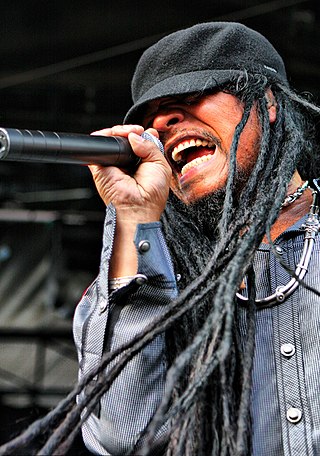
Max Alfred Elliott, known by his stage name Maxi Priest, is a British reggae vocalist of Jamaican descent. He is best known for singing reggae music with an R&B influence, otherwise known as reggae fusion. He was one of the first international artists to have success in this genre, and one of the most successful reggae fusion acts of all time.

Kenneth George Boothe OD is a Jamaican vocalist known for his distinctive vibrato and timbre. Boothe achieved an international reputation as one of Jamaica's finest vocalists through a series of crossover hits that appealed to both reggae fans and mainstream audiences.

"Can't Help Falling in Love" is a song recorded by American singer and actor Elvis Presley for his fourth soundtrack album, Blue Hawaii (1961). It was written by Hugo Peretti, Luigi Creatore, and George David Weiss and published by Gladys Music, Inc. The melody is based on "Plaisir d'amour", a popular French love song composed in 1784 by Jean-Paul-Égide Martini. The song was initially written from the perspective of a woman as "Can't Help Falling in Love with Him", which explains the first and third line ending on "in" and "sin" rather than words rhyming with "you".
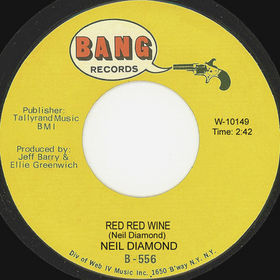
"Red Red Wine" is a song originally written, performed and recorded by American singer Neil Diamond in 1967 that appears on his second studio album, Just for You. The lyrics are written from the perspective of a person who finds that drinking red wine is the only way to forget his woes.

Dennis Emmanuel Brown CD was a Jamaican reggae singer. During his prolific career, which began in the late 1960s when he was aged eleven, he recorded more than 75 albums and was one of the major stars of lovers rock, a subgenre of reggae. Bob Marley cited Brown as his favourite singer, dubbing him "The Crown Prince of Reggae", and Brown would prove influential on future generations of reggae singers.

Inner Circle, also known as The Inner Circle Band or The Bad Boys of Reggae, are a Jamaican reggae band formed in Kingston in 1968. The band first backed The Chosen Few in the early 1970s before joining with successful solo artist Jacob Miller and releasing a string of records. This era of the band ended with Miller's death in a car crash in 1980.
"Breakfast in Bed" is a soul–R&B song written by Muscle Shoals songwriters Eddie Hinton and Donnie Fritts for Dusty Springfield. It takes a knowing spin on the line "You Don't Have to Say You Love Me", the title of a song that had previously been a number one hit for her in the UK. After being released on her 1969 album Dusty in Memphis, it was recorded and popularized the same year by Baby Washington. Harry J produced three reggae versions in 1972, by Lorna Bennett, Scotty, and Bongo Herman.

Labour of Love is the fourth studio album by British reggae band UB40, and their first album of cover versions. Released in the UK on 12 September 1983, the album is best known for containing the song "Red Red Wine", a worldwide number-one single, but it also includes three further UK top 20 hits, "Please Don't Make Me Cry", "Many Rivers to Cross" and "Cherry Oh Baby". The album reached number one in the UK, New Zealand and the Netherlands and the top five in Canada, but only reached number 39 in the US on its original release, before re-entering the Billboard 200 in 1988 and peaking at number 14 as a result of "Red Red Wine"'s delayed success in the US.
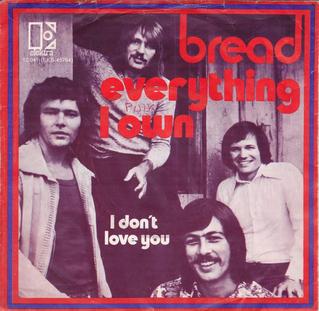
"Everything I Own" is a song written by American singer-songwriter David Gates. It was originally recorded by Gates's soft rock band Bread for their 1972 album Baby I'm-a Want You. The original reached No. 5 on the American Billboard Hot 100. Billboard ranked it as the No. 52 song for 1972. "Everything I Own" also reached No. 5 in Canada and No. 12 in Australia.
"Kingston Town" is a 1970 song by Lord Creator about Kingston, Jamaica, released as a single on producer Clancy Eccles' Clandisc label. It was also recorded in 1989 by reggae group UB40 and was released as the second single from their album Labour of Love II, reaching number four on the UK Singles Chart and number one in France and the Netherlands.

Cover Up is the fourteenth studio album by English reggae band UB40, released on 22 October 2001 through Virgin Records and DEP International. Recorded with co-producer Gerry Parchment at DEP International Studios in Birmingham, the album followed a musical break for the group. It exemplifies their distinct reggae/pop sound and uses programmed rhythms as the basis for songs; the incorporation of the latter caused friction within the band and singer Ali Campbell later criticised the production style.

Susan Cadogan is a Jamaican reggae singer best known for her hit records in the mid 1970s.
"Homely Girl" is a song by American vocal group the Chi-Lites. Release in 1973, it reached number five on the UK Singles Chart, number three on the US Hot Soul Singles chart, and number 54 on the US Billboard Hot 100. A cover by UB40 also became a hit between 1989 and 1991 in several countries.

Homegrown is the sixteenth studio album by English reggae band UB40, released on 3 November 2003 through Virgin Records and DEP International. The follow-up to Cover Up (2001), the album was produced by UB40 at DEP International Studios in Birmingham. Described by Robin Campbell as an old-fashioned UB40 record, Homegrown features both love songs and political numbers. As with Cover Up, its use of programmed rhythms was the cause of musical differences in the band and was later criticised by frontman Ali Campbell.
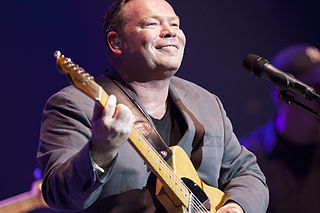
Alistair Ian Campbell is an English singer and songwriter who was lead singer and co-founder of the British reggae band UB40.
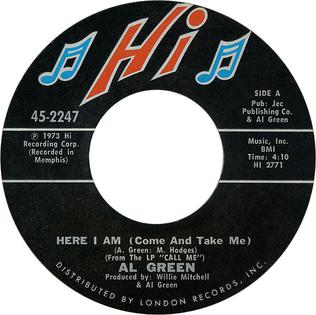
"Here I Am (Come and Take Me)" is a 1973 song by Al Green, the second single released from his album Call Me. The song reached number 10 on the Billboard Hot 100 and number two on the Hot Soul Singles chart. It was certified as a gold record by the Recording Industry Association of America.
References
- ↑ Huey, Steve. "Ken Boothe Songs, Albums, Reviews, Bio & More ..." AllMusic . Retrieved June 13, 2024.
- 1 2 "the train is coming - full Official Chart History - Official Charts Company". Official Charts Company . Retrieved March 24, 2019.